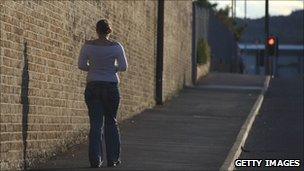Maltreated teenagers 'overlooked' by professionals
- Published

Teenagers in England who are abused or neglected are not being properly protected as resources are directed at younger children, a report warns.
The research found professionals wrongly assumed older children were more resilient to maltreatment and better placed to disclose it.
A fifth of child deaths where abuse or neglect is suspected or known involve children aged over 11, the study said.
It was written by the NSPCC, the Children's Society and York University.
The three-year study of maltreated 11-17 year-olds called for a new approach to child protection for older children.
The researchers said that while safeguarding young children was currently high on the political and professional agenda, the risks faced by 11 to 17 year olds were being overlooked.
This group often faced a wider range of risks due to their social networks, lifestyles and increasing independence, the report said.
"There were indications that young people aged 11-17 were seen as more competent to deal with maltreatment, including being able to escape the situation and seek help."
They were perceived by some professionals as more 'resilient', it said.
"They were more likely to be seen as contributing to and exacerbating the situation through their own behaviour. Young people were sometimes perceived as 'putting themselves at risk'."
In fact, young people had huge difficulty disclosing maltreatment, because they feared the ramifications for their families, struggled to strike up trusting relationships with social workers and did not know how to speak out, the study concluded.
'Just as vulnerable'
It found that the older children became, the less likely they were to be judged at risk and made subject to child protection procedures.
The chief executive of The Children's Society, Bob Reitemeier, said: "Many older children who we work with are just as vulnerable as younger children, if not more so.
"It's important that we review the way we support these young people and which approach works best for them once they have disclosed maltreatment."
Professor Mike Stein, of the Social Policy Research Unit at the University of York, said: "Society is very quick in condemning the behaviour of teenagers.
"This research shows that we are far less responsive in understanding and meeting the needs of those young people who are maltreated'.
Phillip Noyes NSPCC director of strategy and development said: "Children and young people must have access to safe confidential spaces so they can speak about abuse and get help."
- Published20 July 2010